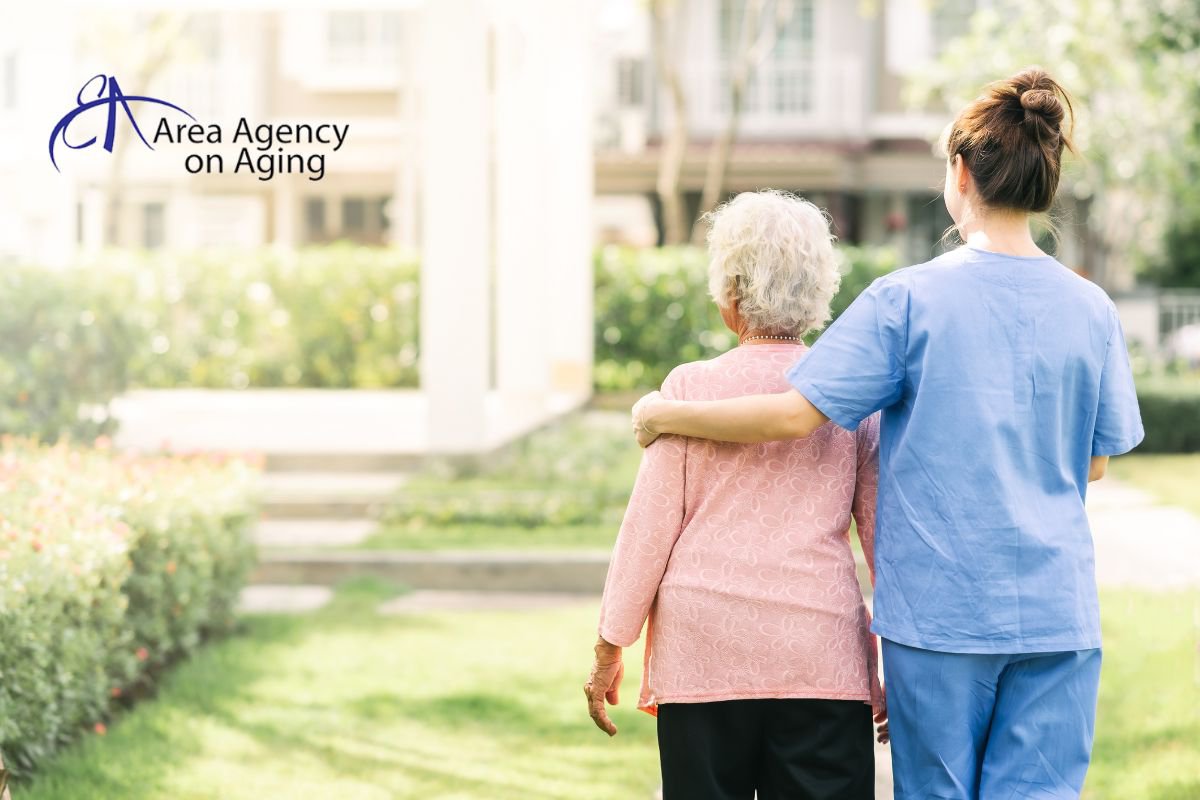Caring for your aging parent at home can feel challenging, but you’re not alone. In-home senior care can help with bathing, dressing, meals, and memory support. But what’s actually included? We’re here to break down what care services are provided, how much they cost, and how to choose the right option.
Key Takeaways:
- Two types of in-home care: non-medical (daily tasks) and medical (nurse/therapist, doctor-ordered).
- Core services include personal care, meal prep, medication reminders, light housekeeping, and companionship.
- National average home care cost in 2024: $33/hour; varies by state ($24–$43/hour).
- Monthly cost examples: $1,000 (7 hrs/week) up to $6,292 (44 hrs/week).
- Specialized care includes memory care, skilled nursing, and palliative/end-of-life care.
- Agencies offer trained, screened staff with support; private caregivers can cost less but offer fewer guarantees.
- Medicaid, Medicare, VA, and local programs may offer low-cost or free services.
- Home care maintains independence, routines, and comfort; services vary with need.
- Care options: hourly, live-in, or 24-hour shifts; respite care available.
- In Spokane, WA, Love In Home Senior Care offers free assessments and care planning.

The Complete Guide to In-Home Senior Care in 2025
As seniors age, many prefer to stay in familiar surroundings—right in their own homes. Fortunately, in-home senior care makes this possible while also offering comfort, dignity, and safety. Whether your loved one needs occasional help or daily support, in-home care offers flexibility, compassion, and independence.
This guide walks through every major aspect of in-home care—what’s included, how much it costs, what types of care are available, and how to choose between private help or a licensed agency. You’ll also learn about local options, support programs, and how to build a care plan that fits your family’s needs.
In-Home Senior Care Services Include a Range of Daily Support
When people think about in-home senior care, they often ask what services are included. The answer depends on the level of need, but most care falls into two categories: medical and non-medical.
Non-medical care is the most common. It includes assistance with tasks that help seniors stay safe and comfortable at home:
- Personal care (bathing, dressing, grooming, toileting)
- Medication reminders
- Meal preparation and nutrition support
- Light housekeeping (dishes, laundry, trash)
- Companionship (conversation, games, walks)
In contrast, medical care often involves licensed nurses or therapists. This includes wound care, injections, therapy, or medical monitoring—usually with a doctor’s order and often covered by Medicare or insurance.
Additionally, some agencies help with:
- Transportation to appointments or errands
- Special diets or feeding assistance
- Medical equipment setup
- Home safety modifications
Each of these services helps seniors maintain independence while reducing stress on family caregivers.
To see how these services are offered locally, visit the East Arkansas Area Agency on Aging and explore their in-home support programs.
Understanding the Cost of In-Home Senior Care in 2025
A common question is, “How much does in-home senior care cost?” In 2024, the average national rate is around $33 per hour. However, prices vary based on location, needs, and the type of care.
Here’s a general breakdown of estimated monthly costs:
- 7 hours/week: ~$1,000/month
- 15 hours/week: ~$2,145/month
- 30 hours/week: ~$4,290/month
- 44 hours/week: ~$6,292/month
Some states charge more. For instance, care in Minnesota or Oregon may cost over $40/hour. Meanwhile, the average in Mississippi or Louisiana average closer to $24/hour.
The total cost also depends on:
- Type of care (basic vs. memory or medical care)
- Location (urban areas tend to cost more)
- Scheduling (evenings, weekends, or 24/7 care raise rates)
For example, 6 hours/day at $33/hour adds up to about $198/day. If care is needed around-the-clock, costs may rival or exceed assisted living.
However, many families reduce paid hours by using community programs for meals, transportation, or volunteer visits.
And yes, some care expenses may be tax-deductible if they qualify as medical expenses under IRS rules.
Specialized In-Home Services Offer Tailored Care
Not all seniors have the same needs. That’s why in-home senior care also includes specialized support.
Memory Care at Home
For seniors with Alzheimer’s or dementia, in-home memory care provides safety and peace. Caregivers assist with:
- Routines to reduce stress
- Reminders for meals and hygiene
- Calming conversation
- Familiar surroundings to prevent wandering
Skilled Nursing and Therapy
Some seniors need skilled nursing care at home. This includes:
- Wound treatment
- Medication injections
- Health monitoring
- Post-surgery recovery
- Physical, occupational, or speech therapy
These services are ordered by a doctor and may be covered by Medicare or Medicaid.
Palliative and End-of-Life Care
When comfort becomes the priority, palliative care at home focuses on:
- Pain relief
- Emotional support
- Family connection
- Honoring end-of-life wishes
Staying at home during this time can be deeply meaningful to both the senior and their loved ones.
Choosing Between a Private Caregiver and an Agency
Another big decision involves how to hire help. Families often ask whether to hire a caregiver directly or go through an agency.
Private Caregiver
Hiring independently can cost less. You choose the person, set the schedule, and manage payroll. But this also means:
- Handling background checks
- Managing taxes and legal documents
- Providing a backup plan if they're sick
Caregiving Agency
An agency costs more, but they handle:
- Screening and training
- Payroll and insurance
- Backup caregivers
- Ongoing supervision
This convenience offers peace of mind, especially for families juggling work and care.
When interviewing caregivers or agencies, ask:
- What experience do you have with our needs?
- Are you available during our preferred hours?
- How do you handle emergencies or absences?
- Do you have references or credentials?
For added safety, agencies often conduct background checks and offer CPR-trained caregivers.
Affordable and Free In-Home Senior Care Options
Paying for care can feel overwhelming, but help is out there. Many local programs reduce costs or provide services free of charge.
Medicaid
If your loved one qualifies based on income and need, Medicaid may cover:
- Bathing and dressing assistance
- Meal preparation
- Personal care aides
Each state’s program varies, but most offer basic in-home senior care through waiver programs.
Medicare
Medicare doesn’t cover daily non-medical care, but it does support:
- Skilled nursing
- Physical therapy
- Medical equipment
- Home health visits (with a doctor’s order)
Veterans Benefits
If your loved one served in the military, VA Aid and Attendance or Homemaker Services can help cover in-home support. Spouses may also qualify. Visit the Veterans Home Care page to learn more.
Local Agencies
Your Area Agency on Aging can connect you with:
- Meal delivery
- Transportation
- Safety checks
- Respite care for family members
In Arkansas, the EAAAA serves 12 counties and offers free care coordination to help you apply for services, benefits, and referrals.
Tax Relief
If you pay for a parent’s care and they qualify as your dependent, you may be eligible for tax deductions. Speak with an accountant to see what applies.
Why Many Families Choose In-Home Care Over Facilities
While care homes serve many well, in-home care offers unique benefits:
- Familiar surroundings reduce confusion and anxiety
- Personal routines remain intact
- Comfort from sleeping in your own bed and eating home-cooked meals
- Flexible schedules tailored to your needs
- Family closeness and less disruption
In addition, care can begin with just a few hours per week and gradually increase as needed. This flexibility allows families to plan as situations change.
Respite Care Offers Relief for Family Caregivers
If you're caring for someone yourself, respite care offers short-term relief by sending a caregiver while you rest, travel, or manage your own health.
This can be arranged for:
- A few hours
- Overnight
- Weekends or vacations
Agencies like EAAAA help connect you with local respite options.
Understanding Schedules: Hourly vs. Live-In vs. 24-Hour Care
Depending on your loved one’s needs, you may choose between:
- Hourly care (just a few hours per day)
- Live-in care (one caregiver lives in the home but sleeps at night)
- 24-hour care (caregivers rotate in shifts and stay awake)
Each model has pros and cons. Hourly care is more affordable and flexible. Live-in care offers consistency but requires space and downtime. 24-hour care ensures constant monitoring but is the most expensive.
Care plans can evolve. Many families start with 7–15 hours per week and adjust over time.
Local In-Home Senior Care in Northeast Arkansas
In Northeast Arkansas, the East Arkansas Area Agency on Aging serves 12 counties and provides personalized, in-home care services.
Their Care Coordinators offer:
- Home safety evaluations
- Help applying for Medicaid, Medicare, or VA benefits
- Meal and transportation coordination
- Medical alert system setup
- Referrals to legal, medical, or housing support
All services are free of charge, and coordinators meet with you in your home to create a personalized care plan.
Get Free Help Building a Senior Care Plan
Looking for help with in-home care, benefits, or support programs? EAAAA’s Care Coordinators offer personalized assistance at no cost. They’ll meet with you at home, help you understand your options, and connect you to the right services. Whether you need meals, transportation, or full-time care, this is the best place to start. Contact us today.
In-home senior care offers more than convenience—it provides peace of mind. From basic help with meals to full-time skilled nursing, care at home can be tailored to every stage of aging. Costs vary, but support is available through local programs, Medicaid, veterans' benefits, and tax breaks. Whether you hire privately or through an agency, the goal remains the same: helping your loved one age with safety, dignity, and comfort in the place they know best.


